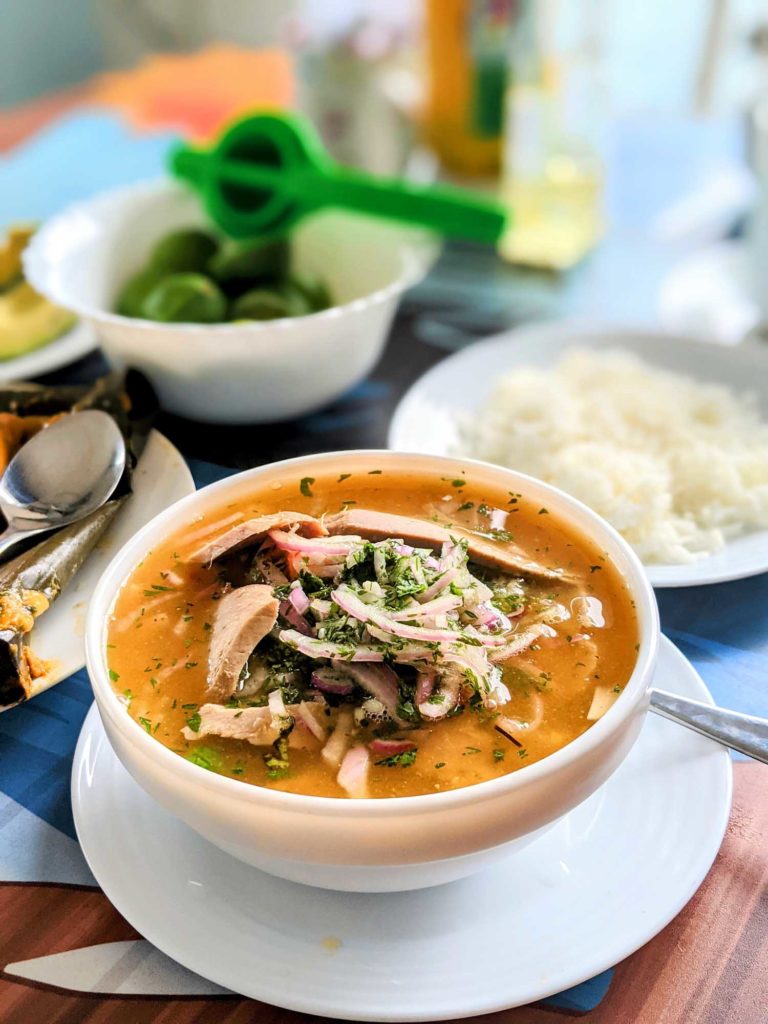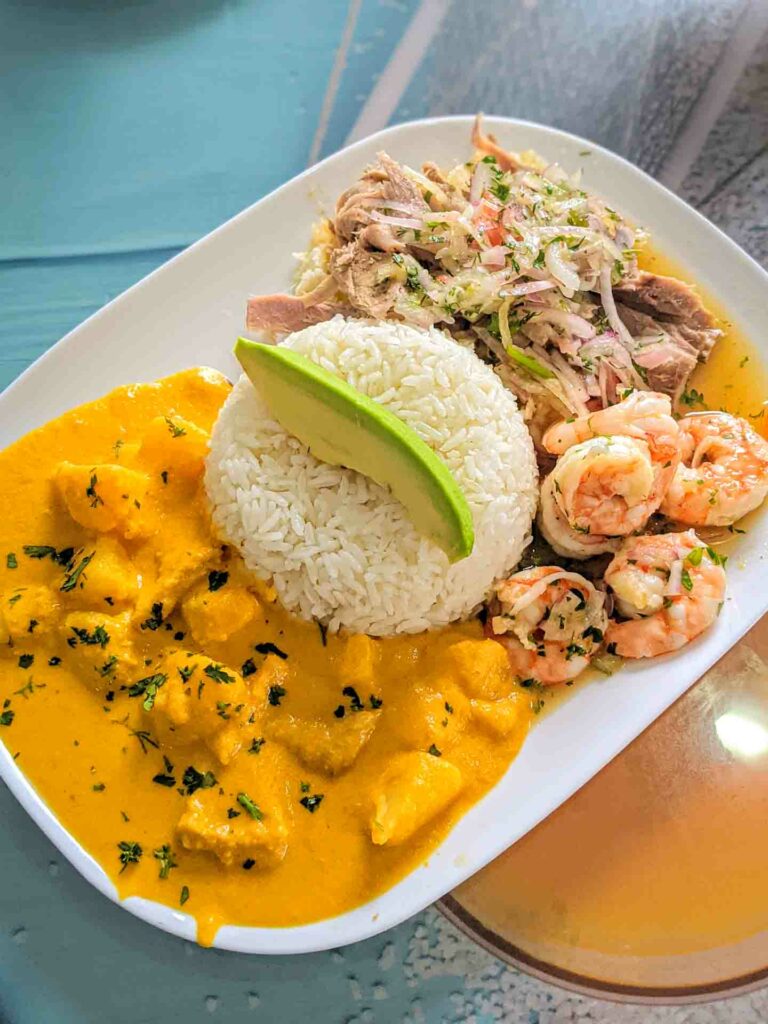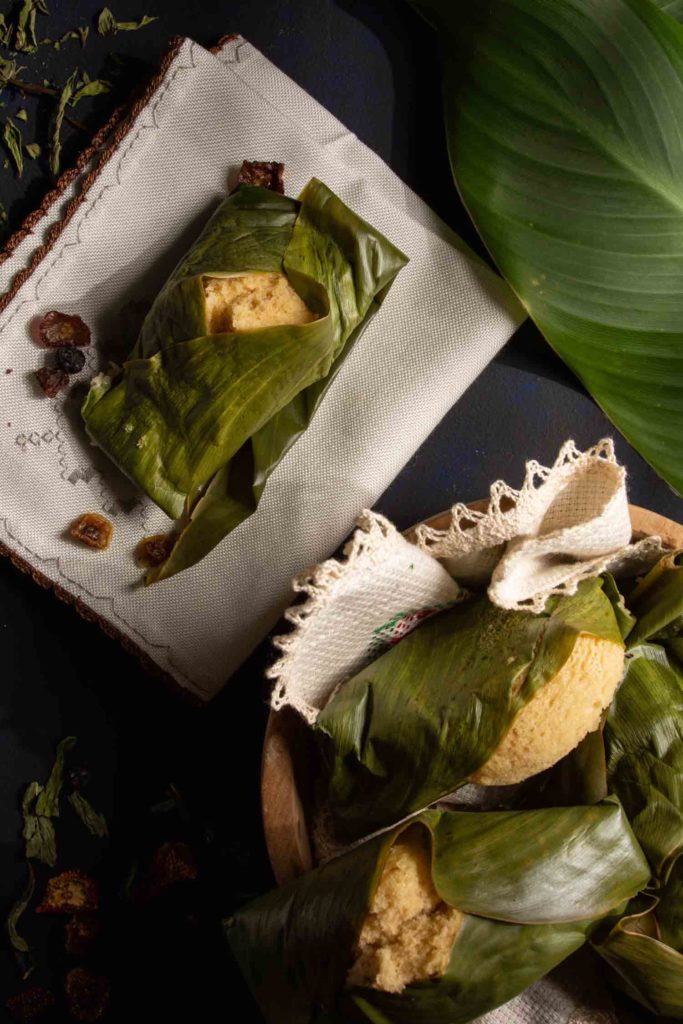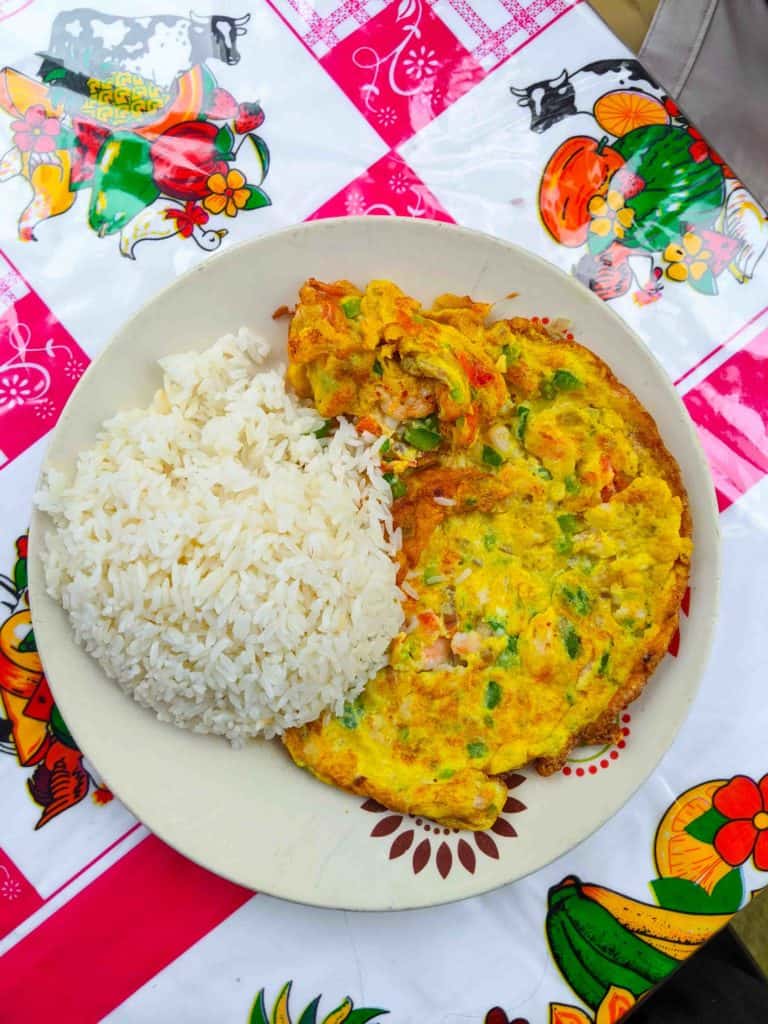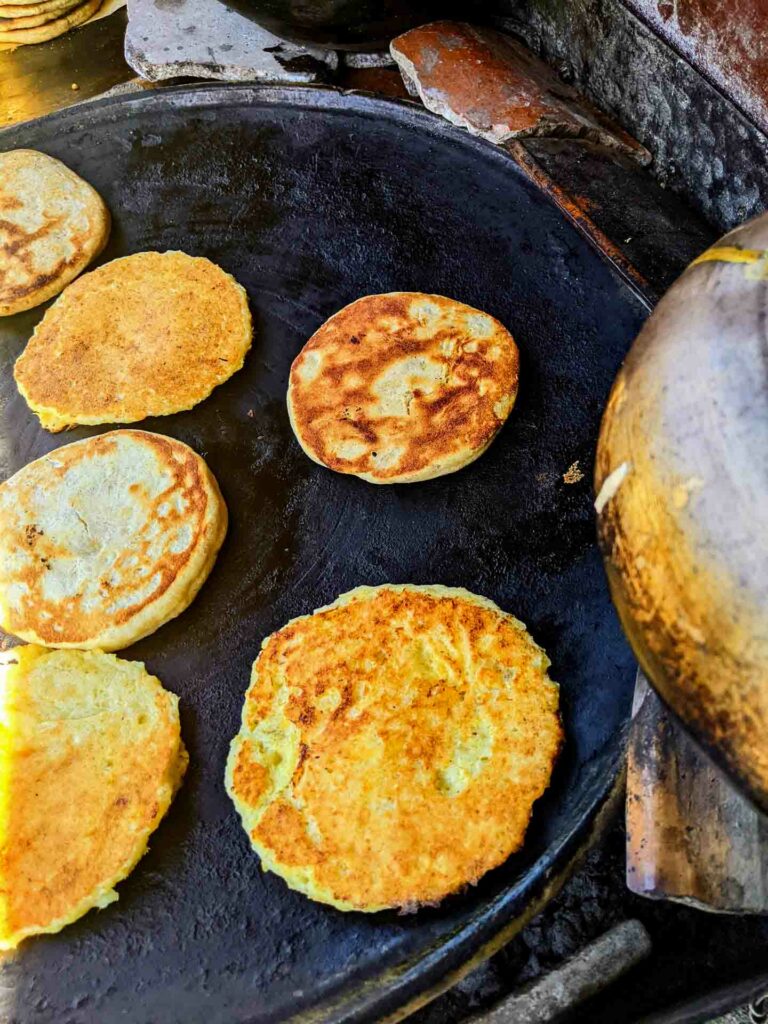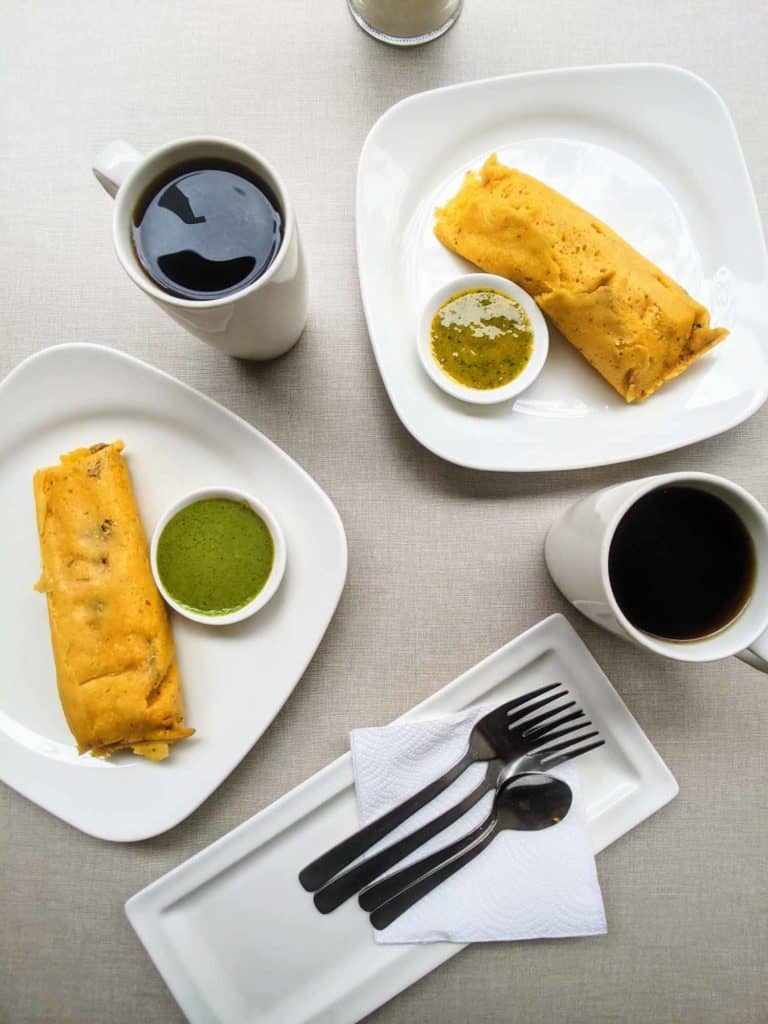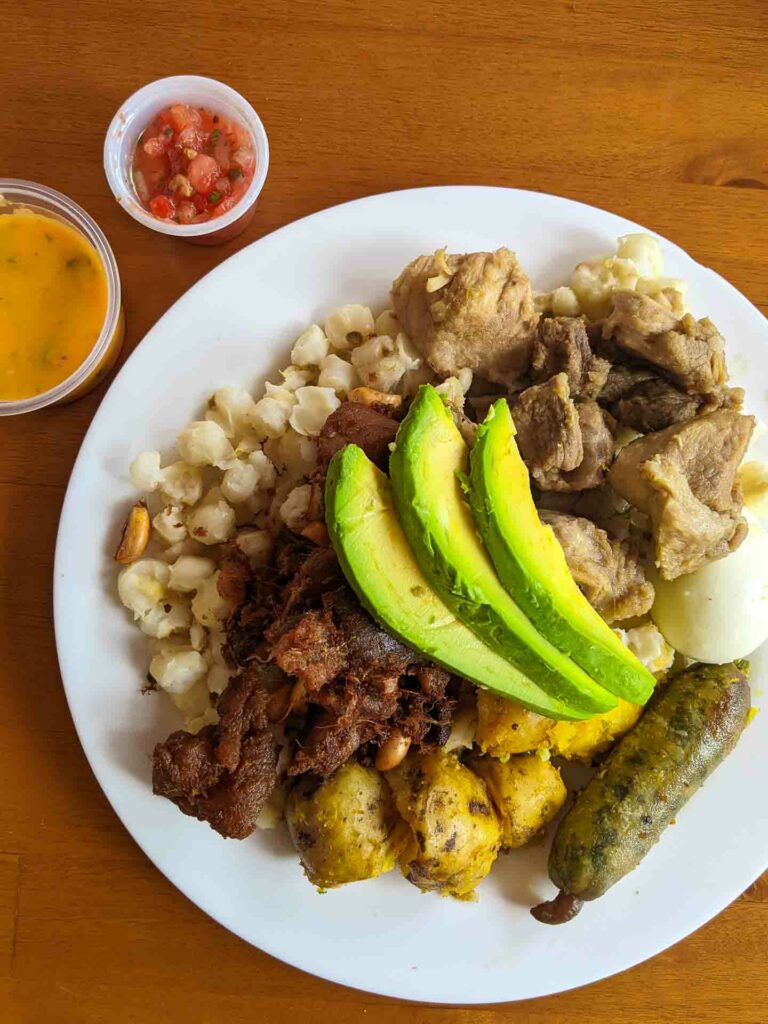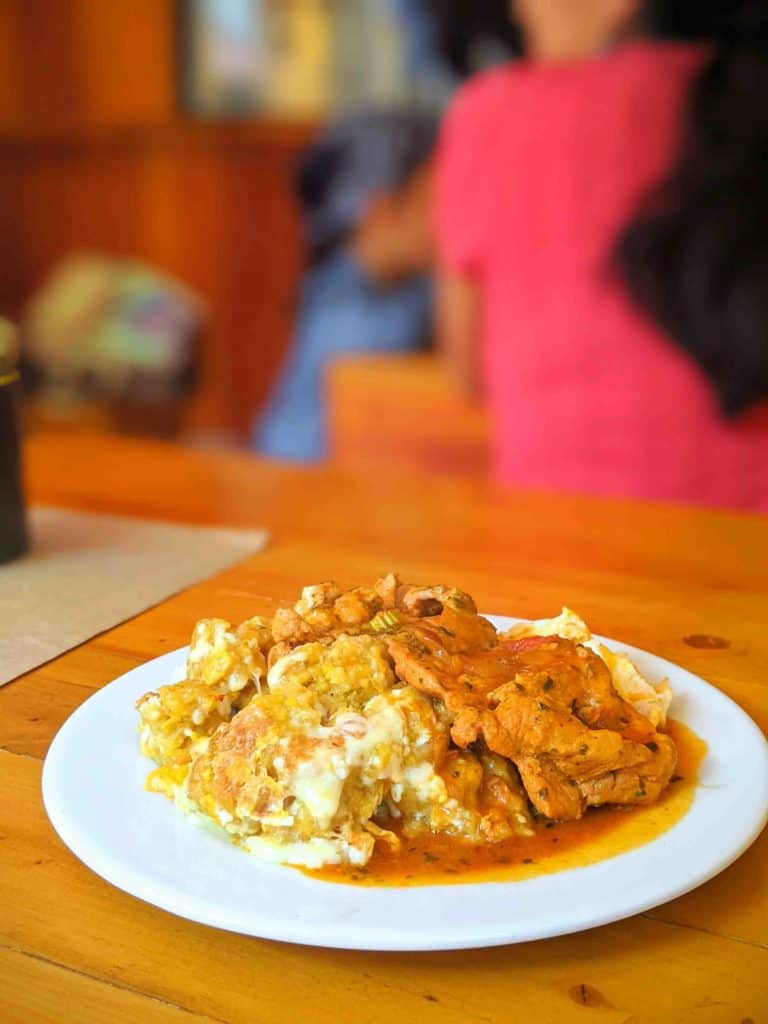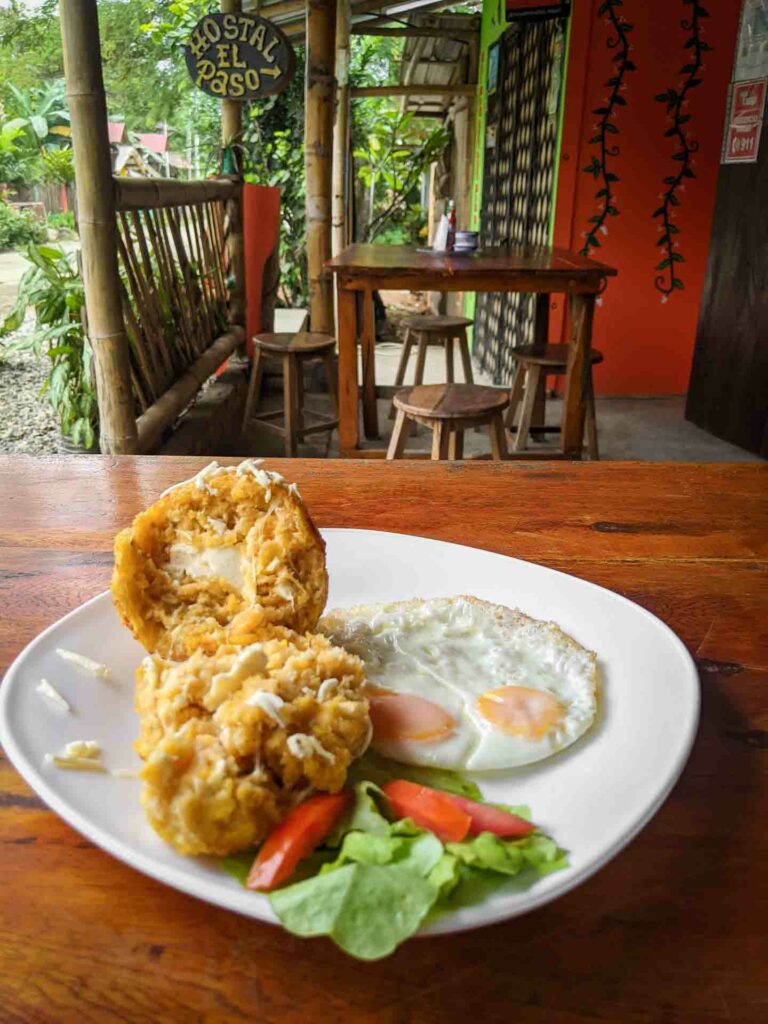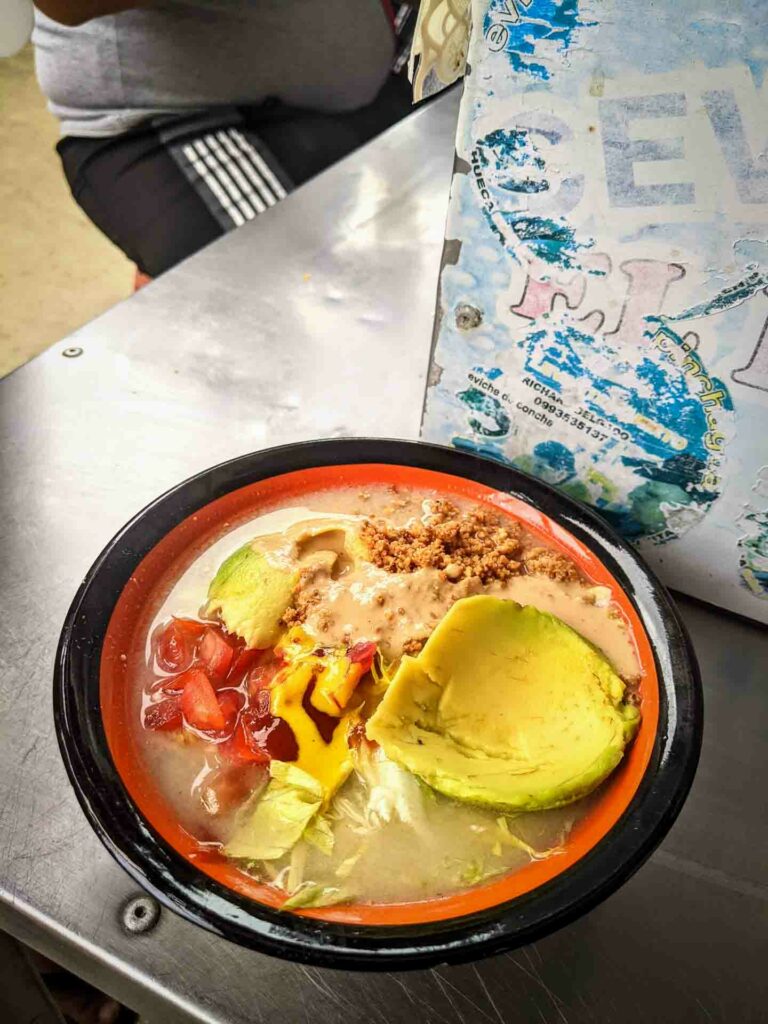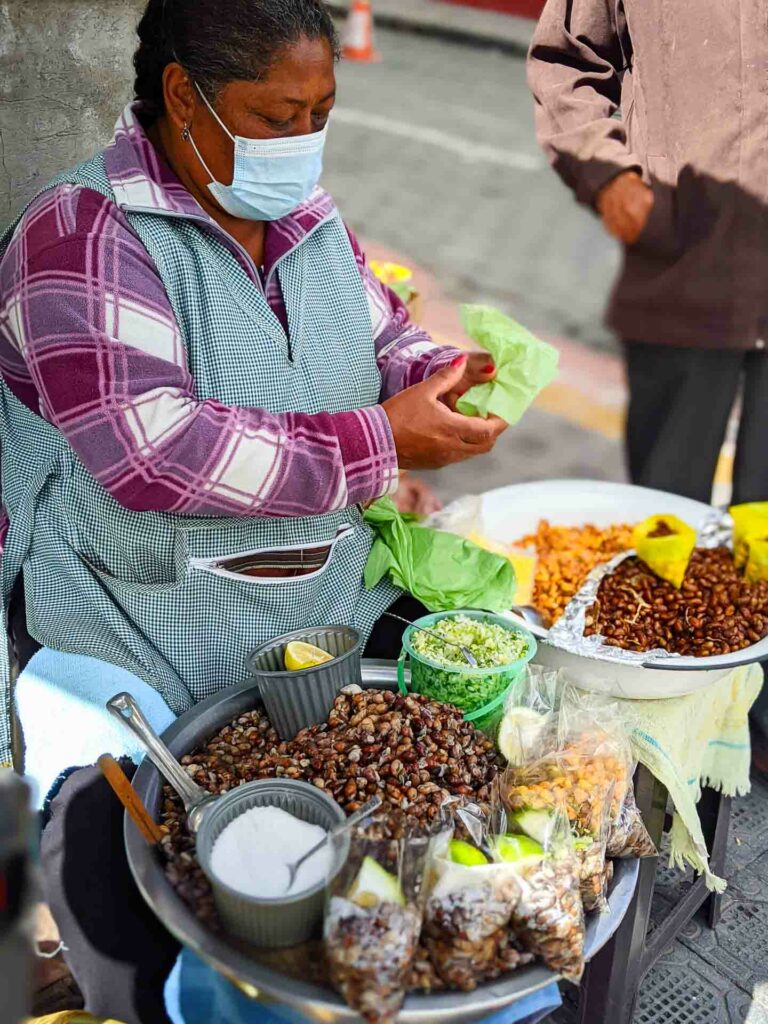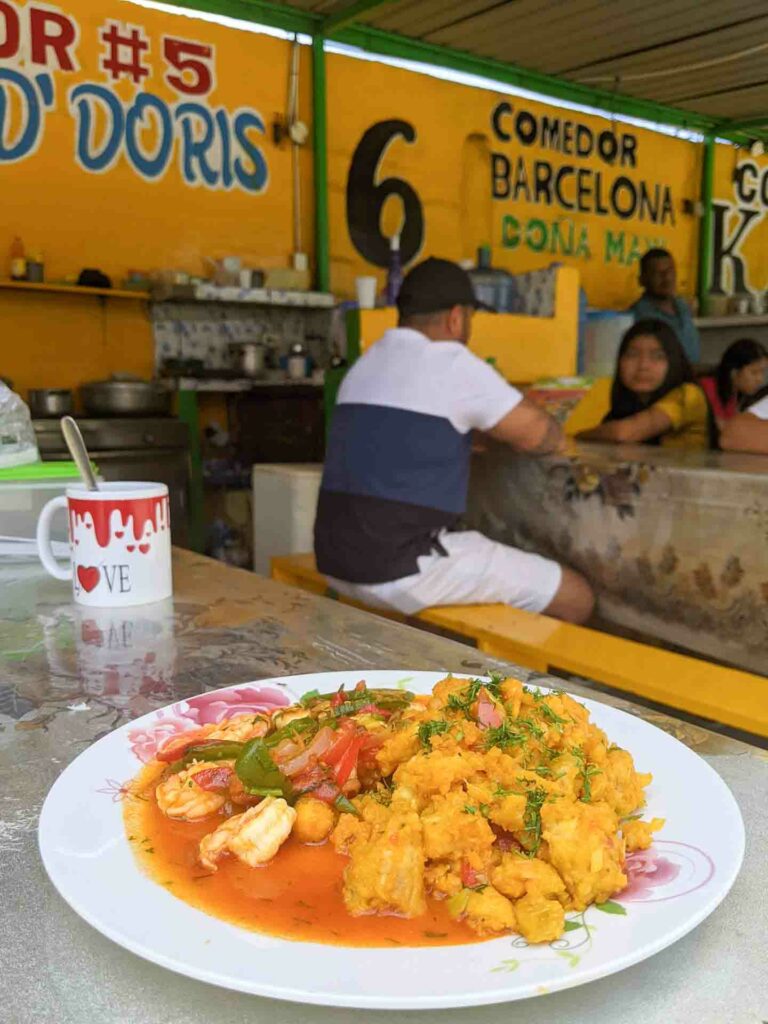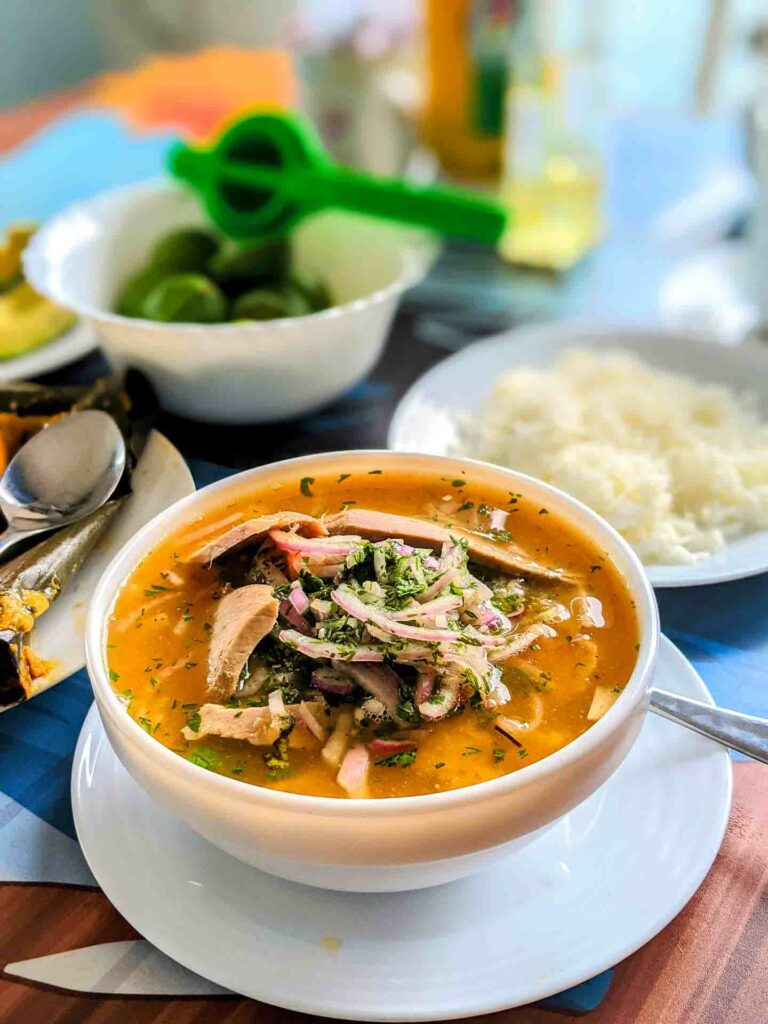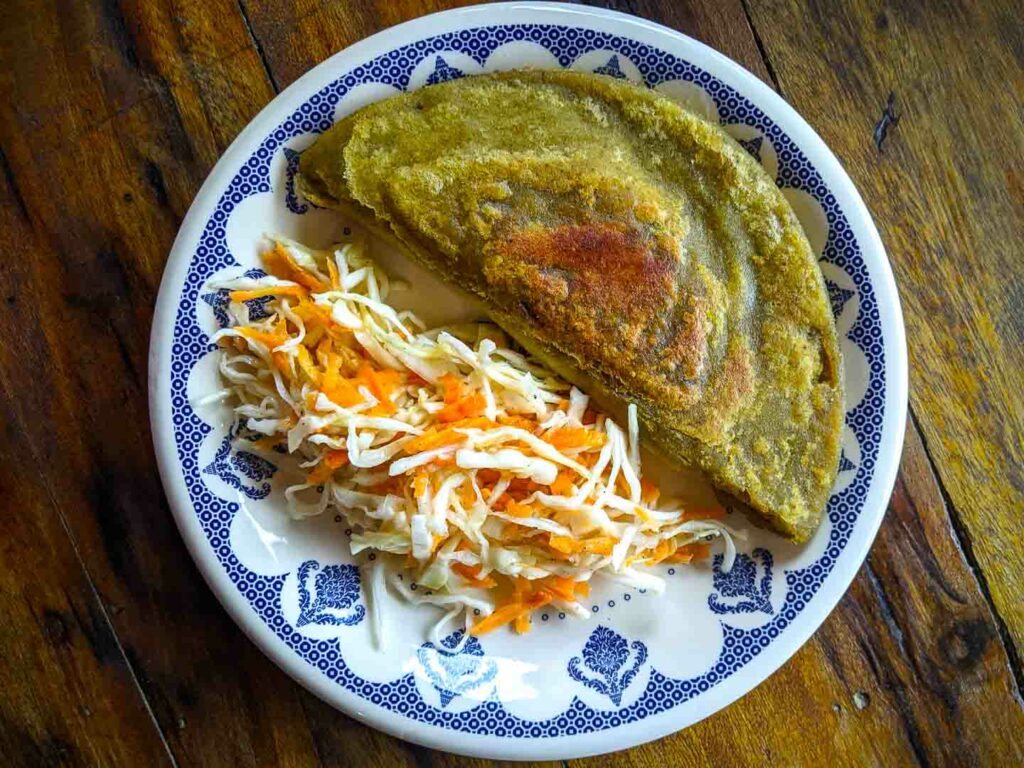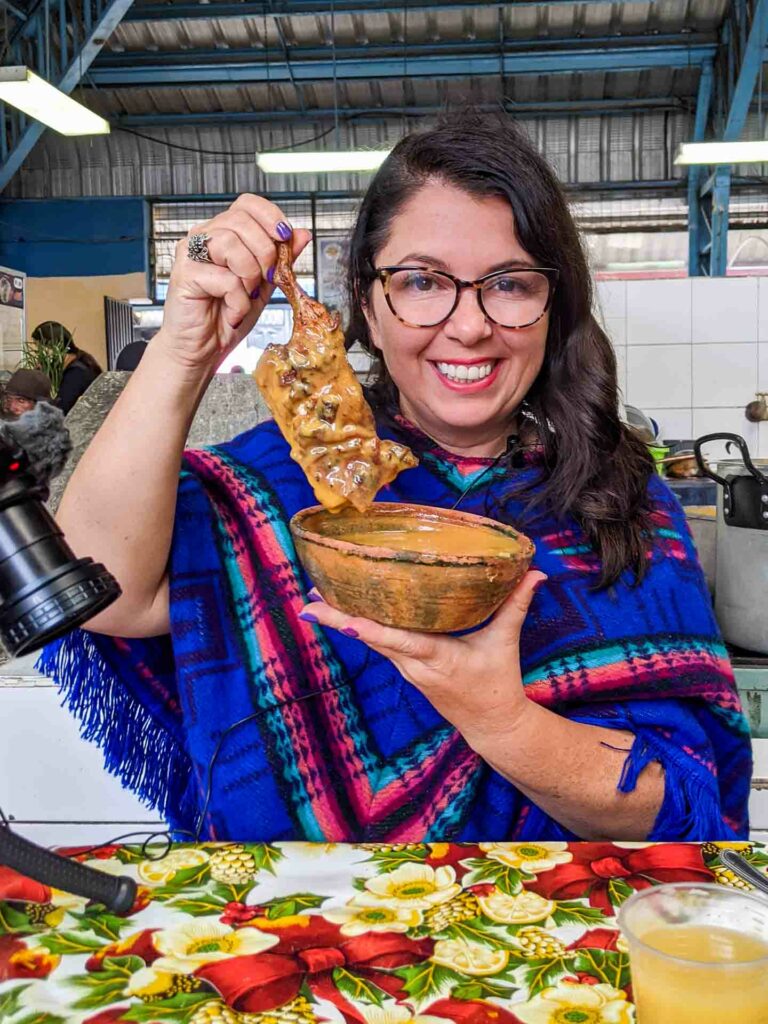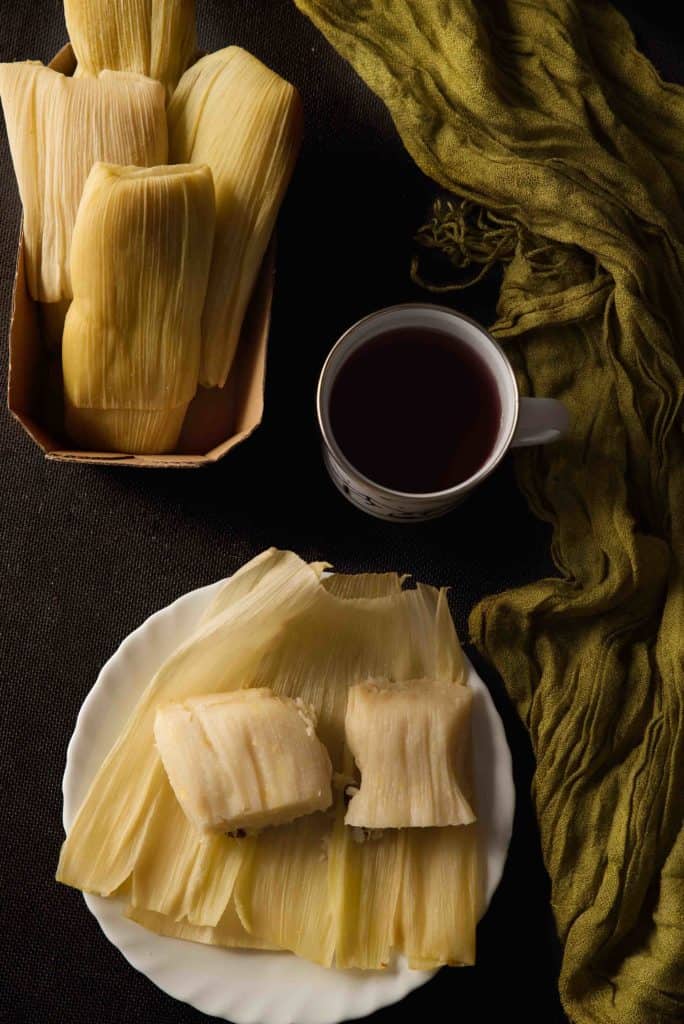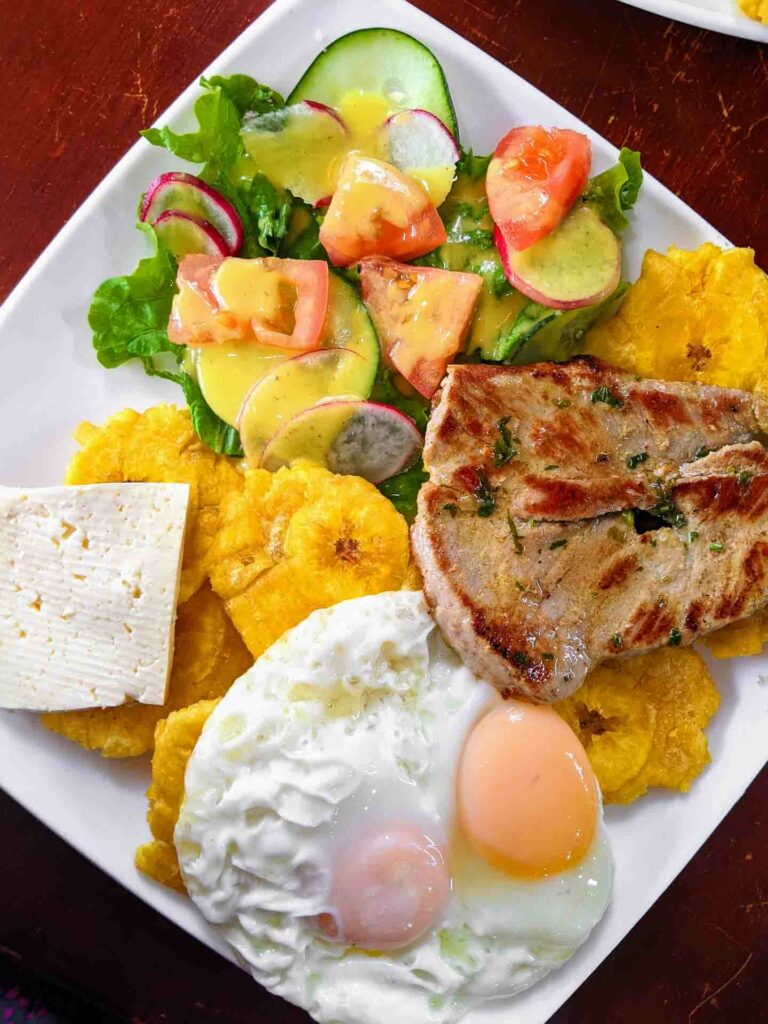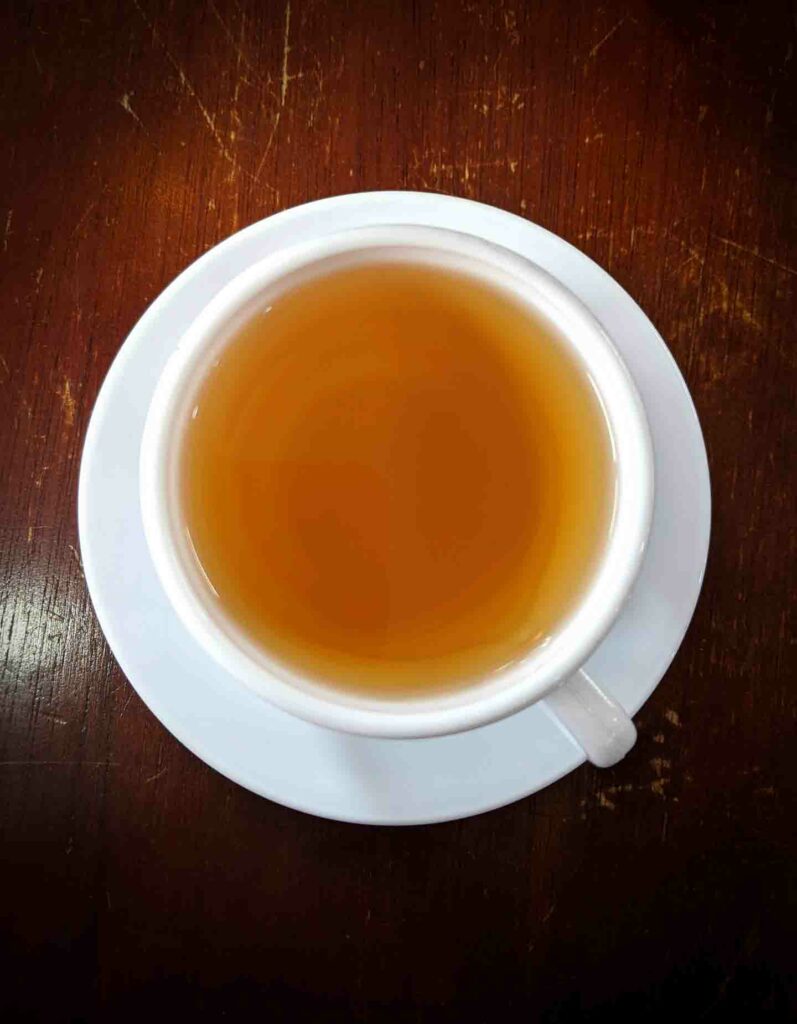Traditional Ecuadorian breakfast dishes will win over even the pickiest eater with encebollado, tigrillo, empanadas, majado, bolon de verde, hayaca and so many ceviches.
I am not a breakfast person. I don’t like pancakes or waffles and most of the savory dishes can go too.
When I first visited Ecuador in 2010 I realized that I was a breakfast person, I was just eating the wrong breakfast.
What I love about breakfast in this small South American country is that it is so diverse.
What is a Typical Breakfast in Ecuador
Throughout the country, staples like empanadas, bolon de verde (green plantain dumplings), and colada de avena (oatmeal drink) but you’ll see small differences based on local ingredients.
In the Andean highlands, hearty dishes like mote pillo (hominy with eggs) and tigrillo (green plantain mash) are popular, providing a filling start to the day.
Ecuadorian Food
Coastal regions offer an array of seafood-based breakfasts, such as encebollado (fish and onion soup) and ceviche de pinchagua (pinchagua fish ceviche), showcasing the bounty of the Pacific Ocean.
In the Amazon, breakfasts often feature ingredients sourced from the rainforest, including exotic fruits, yuca, and fresh fish.
Traditional Ecuadorian Breakfast
It was difficult to limit this list to only 23 Ecuadorian breakfasts and so I included the most common, most loved alongside others that are not as common.
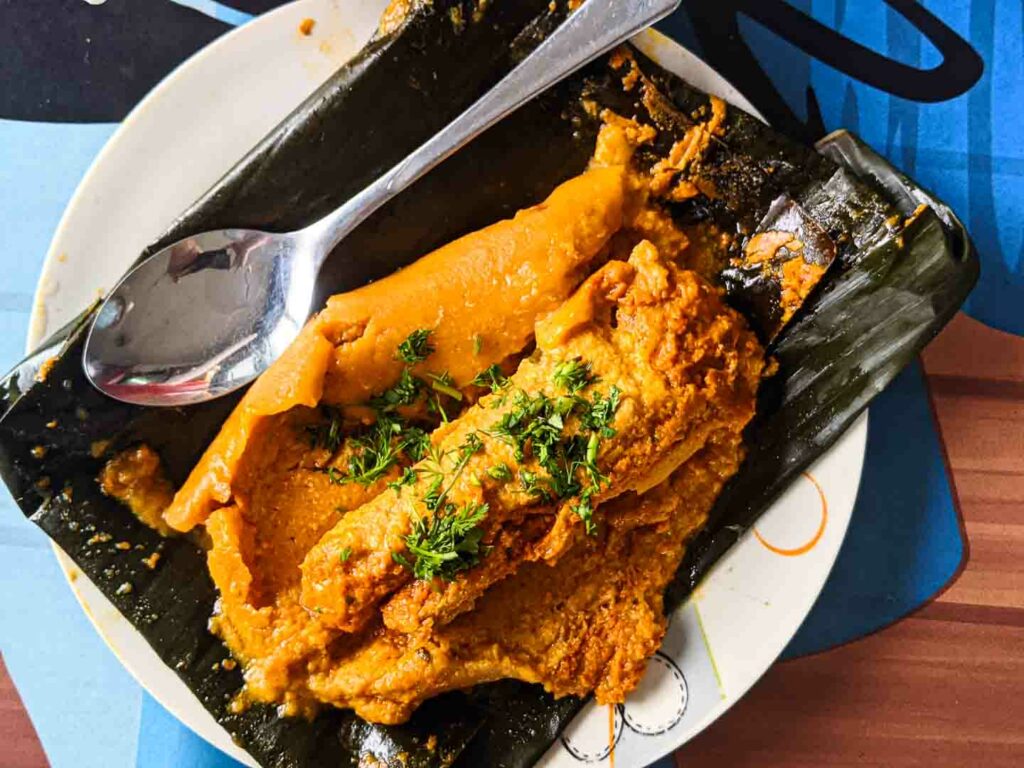
1. Hayaca | Hallaca
There are SO MANY Ecuadorian foods that are wrapped in some kind of leaf or husk. Outsiders call them all tamales but in Ecuador they each have their own name.
Hayacas are made with cornflour and filled with beef, chicken or pork, vegetables, egg and steamed in banana leaves.
They corn flour includes broth, which flavours the cake-like texture and lard mixed with achiote/annatto gives it a reddish hue.
You’ll find variations all over the country and it’s most common to see during Christmas in Ecuador, particularly in the Andes.
Hallacas were originally a Venezuelan food that traveled throughout Latin America and the Caribbean with Spanish invaders.
It’s a common Eastern Cuban food, and known as pastelle in Trinidad.
2. Bandera | Flag
Bandera means flag and Ecuador is not the only country to serve a dish to represent its flag. Although not to the point of mimicking its colors as finding blue food in Ecuador would be challenging.
Instead bandera is a hearty meal on a plate. On the coast it almost always has guatita, ceviche and one other dish.
It may be a second ceviche (like above), seco de chivo or whatever else is available that day.
Costeños are known to make the best rice and you’ll always get amazing local avocado on the side.
3. Quimbolitos | Quimbolitos
Quimbolitos are sweet, steamed cakes wrapped in achira or plantain leaves. They are made with corn flour, wheat flour, eggs and cheese or raisins.
Neighboring Andean countries have similar dishes, it’s a common Colombian food and is similar to Peru’s Humitas dulces.
This is a common Ecuadorian breakfast in the Andes as well as great for an afternoon snack with coffee.
4. Perico | Scrambled Eggs
Perico is a simple yet beloved scrambled eggs dish, often mixed with tomatoes and onions.
It is not originally Ecuadorian but is a popular Colombian breakfast food that made its way to Ecuador’s coast in cities like Puerto Lopez.
This dish reflects European influences and colonization. You’ll find it all over Ecuador, from Andean highlands to coastal regions, usually served with fresh bread in the Andes or tostones along the coast..
5. Tortillas and Morocho | Corn Pancakes and Spiced Corn Drink
This is not like a tortilla you’ll find in Mexico.
Ecuadorian tortillas are made with various ingredients, including different kinds of corn. They can be sweet or savory.
In the Andes they are served with a traditional Ecuadorian drink called morocho. I had these in Paute, a small community outside Cuenca.
Morocho is a warm mix of cracked corn, cinnamon, sugar, raisins and milk. Sometimes it’s so thick you need a spoon.
This breakfast reflects the strong Indigenous roots in Ecuador. It’s why you’ll also see similar dishes throughout Mexico and Central America.
6. Tamals Lojano | Loja-style Tamales
Of course you can find tamals all over Ecuador, but the city of Loja is famous for the tamal Lojano as it’s just a bit different.
Traditional Ecuadorian tamales use maiz sabroso, which is a cornstarch based flour. It’s cooked in an achira leaf and can be a bit crumbly.
Chicken, pork, beef and fresh cheese are common ingredients, but if you eat one in Loja I think the best part are the accompanying dipping sauces.
7. Mote Pillo | Hominy with Eggs
Mote pillo combines hominy corn with scrambled eggs, a dish with deep indigenous roots. It’s seasoned with onions and garlic, reflecting Spanish influence.
Although you can find mote throughout the Andes, I think they take it most seriously in Quito where restaurants only serve variations of mote such as Los Motes de San Juan in this video.
My favourite is mote sucio where the hominy is mixed with pork lard called mapahuira.
Although some think the Mexican snack esquites are similar, it actually uses corn instead of hominy.
8. Tigrillo | Green Plantain Mash
The base recipe of tigrillo is a savory mash of green plantains, fresh cheese, and eggs.
But the really great places also add secos, meat cooked in sauces).
It is originally from the gold mining city of Zaruma in the El Oro province.
As it was originally a dish to give sustenance to gold miners it’s about as hearty as you can get. This is definitely a breakfast in Ecuador you’ll want to split.
And while there is a famous restaurant tourists visit to eat tigrillo, locals go to a hole in the wall called Cafe Tigrillo.
10. Bolon de Verde | Green Plantain Balls
Bolon de verde are softball size balls of plantain often stuffed with cheese or pork. They are one of the few Ecuadorian breakfast dishes you can find all over the country.
My favorite are on the coast, if you find a kitchen with an Esmeraldas cook try asking nicely if they’ll make one with shrimp.
While unique to Ecuador, they’re somewhat similar to West African fufu.
11. Arroz con Leche Sandwich | Rice Pudding Sandwich
The Arroz con Leche Sandwich is a sweet twist on a classic, turning rice pudding into a sandwich filling. Influences are a blend of Spanish and indigenous.
I ate it in Gualaquiza at the market where it was mixed with cinnamon and panela (unprocessed sugar cane) and served in a soft roll.
While rice pudding is global, this sandwich form is unique to Ecuador. It’s a novel treat found in various regions, often enjoyed as a dessert.
12. Ceviche de Pinchagua | Pinchagua Fish Ceviche
There is much debate over the origin of ceviche and while Peru insists it’s originally a Peruvian dish that could be debated.
After all, we’re talking about centuries ago when borders were different than today.
But also Ecuadorian historians have made a strong argument that iche is an Indigenous word unique to the Manabi province on the coast of Ecuador.
This is evidenced in many words like corviche, corviche, troliche. And of course, ceviche.
Ecuadorian Slang
But the method of preparation isn’t unique to South America, as poke in Hawaii, kokoda in Fiji and the Filipino kinilaw recipe are similar.
And so it’s best not to argue over the past and instead enjoy the delicious present. Ecuador has so many kinds of fresh fish and shrimp ceviche.
Ceviche de pinchagua is lesser known outside Manta, Manabi. It’s a fresh, tangy ceviche considered to be an aphrodisiac.
These local sardines are a far cry from what we know in cheap tins. They are brought in daily by fishermen and the best ceviche is at the market.
Here they serve it in a controversial way that must be tried. Adding mustard, ketchup and peanut paste sounds odd but is amazing in this ceviche.
13. Catzos | White Beetle
For something a bit different head to Otavalo for a uniquely Ecuadoran breakfast. On the corner of Don Caldron and 31 de Octubre you’ll find locals flocking to vendors selling catzos.
These fried white beetles are the size of small kidney beans. They are prepared with onions and spices, creating a delightful crunch reminiscent of a flavorful chip.
They’re often paired with tostado (roasted corn) and doused in aji de tomate de árbol hot sauce that adds a fruity kick, balancing the dish’s saltiness.
Get there early as vendors typically sell out by mid-morning, so arriving early is essential. It’s just a dollar a bag and worth the tasty surprise.
14, Majado | Mashed Plantains
Majado is a hearty dish of mashed green plantains, often mixed with cheese or pork.
You might think that tigrillo and majado are the same. But they are not.
While both used mash green plantains and fresh cheese, majado does not use eggs or milk.
It is a coastal Afro-Ecuadorian dish, similar to the Caribbean’s mangú. And the best recipes will also use a seafood seco (cooked in sauce).
I have only seen majado in Esmeraldas, while eating at Atacames beach. But it blew me away and I wish it was still safe to travel in Esmeraldas so I could go back.
Hands down the best seafood is from Esmeraldas.
It’s why if someone from Esmeraldas is cooking in a restaurant elsewhere in the country they always mention negrita/negrito to signal the best food.
15. Encebollado | Fish and Onion Soup
Encebollado is a hearty fish soup with onions, tomatoes and yuca.
It is most often a tuna soup that is covered in fresh onion, hence the name encebollado as it’s covered in cebolla.
Encebollado is Ecuador’s national dish. I learned in Canoa that’s also known as the perfect hangover cure in Ecuador.
Ecuadorian Soups
In the Andes it’s more common to see catfish, which doesn’t quite capture the same essence. It’s worth waiting for a visit to the coast to try the real thing.
Often served with a side of plantain chips along the coast, popcorn in Cuenca or bread in Quito – although there’s much debate over whether bread and popcorn are acceptable.
16. Pan de Yuca | Yuca Bread
Pan de yuca, or yuca bread, is a cheesy, gluten-free bread made from yuca flour. It’s influenced by both Indigenous and European cuisines.
Similar to Brazilian pão de queijo Pan de Yuca is a common snack or Ecuadorian breakfasts on the go with a coffee.
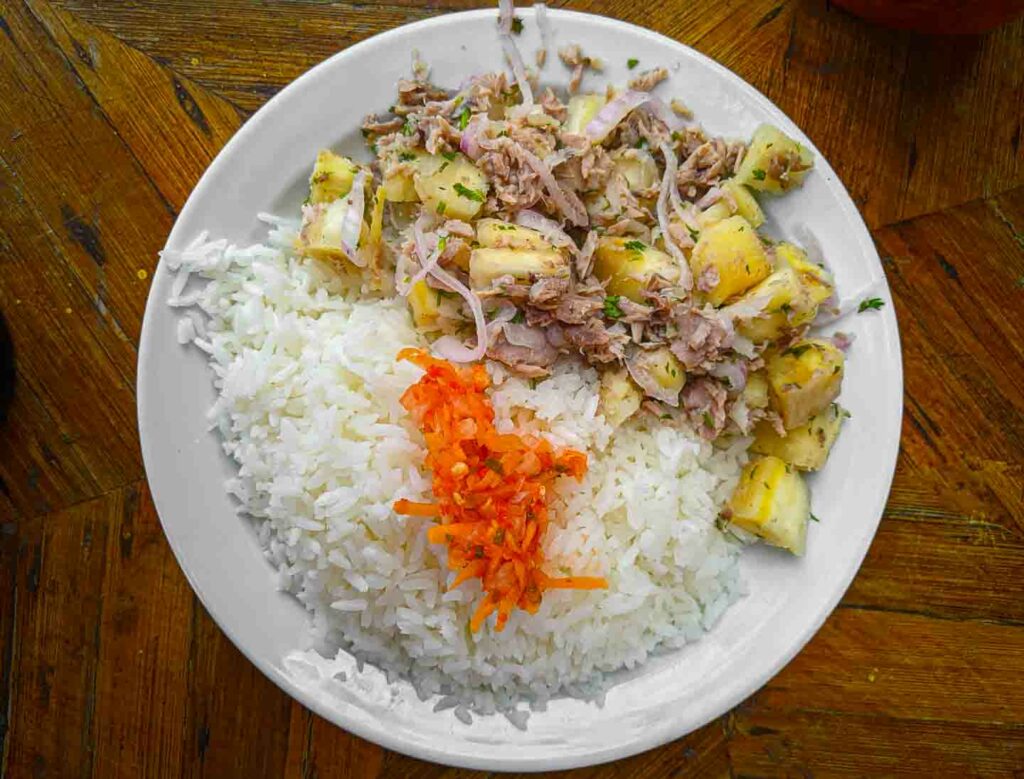
17. Picante de Pescado | Spicy Fish
Picante de pescado is a traditional dish featuring fish seasoned with a spicy sauce made from chili peppers and other local spices.
This dish has Indigenous and Spanish influences, showcasing Ecuador’s diverse culinary heritage.
While spicy seafood dishes are common in many coastal countries, Picante de pescado is distinct to Ecuador’s coastal cuisine, celebrated for its fiery yet flavorful profile.
It somewhat looks like a fish ceviche. I’ve only ever seen this dish in Olon at the fish market.
18. Empanada de Verde | Green Plantain Empanadas
Although Ecuador isn’t as well known for empanadas as Venezuela or Argentina, they have several kinds made with different grains.
Empanada de verde is similar to other Latin American empanadas, but with a unique plantain twist. It consists of green plantain dough filled with cheese or meat, then fried.
These are a popular breakfast in the coastal regions like Salinas, loved for their crispy exterior and savory filling.
They are often served with a vinegar based coleslaw that balances the fried dough.
Loja is also known to have its own unique empanadas with amazing dipping sauces.
19. Colada de Avena | Oatmeal Drink
Colada de avena is a warm, spiced oatmeal drink, thickened to a creamy consistency.
It’s also known as Quaker – as in Quaker Oats, which was the dominant supplier of oats in Ecuador for many years.
The method of making it is influenced by Indigenous traditions of making hearty breakfasts in Ecuador. In the Andes breakfast needs to be warm and sustaining.
This drink is popular today although often an instant mix. But you’ll still find vendors in local markets making it the traditional way.
21. Colada de Cuy | Guinea Pig Broth
Colada de cuy is a traditional broth made from guinea pig, a staple protein in Indigenous Andean culture.
It’s basically cooked guinea pig served in a gravy like soup.
You won’t find anything like this Ecuadorian breakfast anywhere – not even Peru or Bolivia. Cuy is still common for Ecuadorians to eat cuy in the Andes; however, I have only seen this Ecuadorian breakfast at the Cotocachi market.
The vendor said she’s there every Saturday but you need to come early as it’s sells out each morning.
Getting Robbed in Ecuador
21. Champus y Pan | Fruit Mash and Bread
Champus is a traditional Ecuadorian fruit mash made with maize, pineapple and spices. It is almost always served with bread.
This dish has Indigenous origins and is still common to find in Cotocachi in northern Ecuador.
It’s a typical breakfast in the Andean highlands, enjoyed for its sweet and comforting taste.
22. Humitas | Steamed Corn Cakes
Humitas are steamed corn cakes, similar to Mexican “tamales,” but are sweeter and often served with coffee.
Like most corn based Ecuadorian food, they have Indigenous origins.
In Ecuador, Humitas can be found both in the Andes and the coastal regions, enjoyed as a warm breakfast treat.
23. Churrasco Ecuatoriano | Ecuadorian Steak
Churrasco Ecuatoriano is a hearty breakfast featuring grilled steak, eggs, fries, and avocado.
It reflects a blend of Indigenous and European influences. Similar to Brazilian “churrasco,” but served as a breakfast plate.
This filling meal is widespread throughout Ecuador although I first tried it in Macas, the largest city in Ecuador’s Southern Amazon.
It provides a protein-packed start to the day.
BONUS: Guayusa Tea | Guayusa Tea
Ecuadorians call it the Amazonian Red Bull, guayusa tea is a caffeinated herbal tea made from the leaves of the guayusa plant, native to the Amazon rainforest.
Indigenous Peoples in the Amazon have consumed this Ecuadorian drink for generations. While it’s not technically a breakfast food, this energizing drink is consumed throughout Ecuador as part of breakfast.
